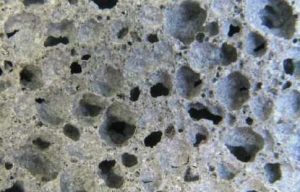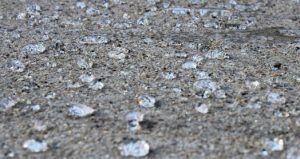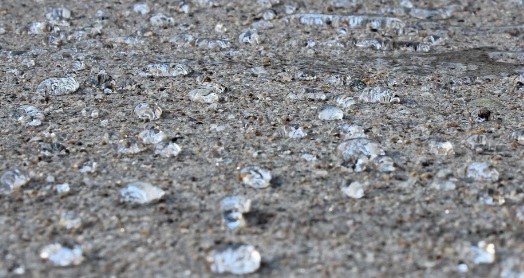Penetrating sealers are designed to seal concrete internally, from within the pores. They don’t leave behind a surface film or coating, and they won’t change the look or color of the concrete. The two most common types of penetrating sealers are concrete densifier sealers and concrete water repellent sealers.
Best Penetrating Concrete Sealers: Densifiers
Concrete densifiers chemically react to form a crystalline barrier within the pores that reduces the size of the pores. By reducing the size of the pores, the density and strength of the concrete is increased. Concrete densifiers are commonly used to seal concrete with dusting issues, or concrete that is showing signs of deterioration caused by surface abrasion to a weak surface.
 There is never any harm in using a densifier. If the concrete is bare and has never been sealed before, then using a densifier is a great option. It will increase the strength and density of the the concrete and help to dramatically reduce dusting and deterioration. Densifiers are great sealers, and another benefit to using them is that they only need to be applied once. The crystalline barrier that is formed during the chemical reaction is permanent and will never break down. In fact, the only way to remove it is to remove the concrete itself.
There is never any harm in using a densifier. If the concrete is bare and has never been sealed before, then using a densifier is a great option. It will increase the strength and density of the the concrete and help to dramatically reduce dusting and deterioration. Densifiers are great sealers, and another benefit to using them is that they only need to be applied once. The crystalline barrier that is formed during the chemical reaction is permanent and will never break down. In fact, the only way to remove it is to remove the concrete itself.
The two most common types of concrete densifiers are lithium silicate densifiers and sodium silicate densifiers. They both product the same chemical reaction and same silicate structure. So what’s the difference? Sodium silicates have a larger molecule and work best on porous concrete and lithium silicates have a smaller molecule and work best on dense concrete. Molecule size is directly associated with penetration so you want large molecules for porous concrete and small molecules for dense concrete. Lithium silicates are also faster acting silicates than sodium silicates which is why lithium silicate sealers are becoming increasingly popular in polishing applications.
Sodium silicate concrete sealer reviews:
- Armor S2000 Concrete Sealer Review (concentrated)
- RadonSeal Concrete Sealer Review (pre-diluted)
- Stone Technolgies X-1 Concrete Sealer Review (pre-diluted)
- Ashford Formula Concrete Sealer Review (pre-diluted)
Lithium silicate concrete sealer reviews:
- Armor L3000 Concrete Sealer Review (concentrated)
- PS103 Concrete Sealer Review (pre-diluted)
- Lion Hard Concrete Sealer Review (pre-diluted)
Best Penetrating Concrete Sealers: Water Repellent Sealers
Water repellent sealers chemically react below the surface to form a hydrophobic barrier within the pores. The barrier formed will reduce the absorption of water and liquids on the surface. When water is spilled onto concrete sealed with a water repellent sealer, the water will “bead” on the top of the surface instead of being absorbed in. The concrete will maintain a dry look. The surface water, because it is unable to penetrate, will sit on the surface until it is able to evaporate. By reducing the absorption of water into the concrete, damage and deterioration caused by water absorption is also reduced. Here are a few of the many benefits offered by a water repellent sealer:
- Mold and mildew need moisture in order to grow. By reducing standing
 moisture and moisture accumulation in the pores, the formation of mold and mildew is reduced.
moisture and moisture accumulation in the pores, the formation of mold and mildew is reduced. - Efflorescence needs water and moisture to move through the pores of the concrete where it can form on the surface. By reducing the absorption of water and movement of moisture, the formation of efflorescence is reduced.
- Freeze thaw damage is caused when water is absorbed into the concrete where it freezes within the pores. By reducing water absorption, water will no longer be able to freeze within the pores, reducing cracking, spalling, and chipping.
- De-icing salts cause ice to melt into water where it can be absorbed into the pores of the concrete. By reducing the absorption of water, you reduce freeze-thaw damage.
There are a few different types of water repellent sealers but the best are siliconate sealers and silane-siloxane hybrid sealers. Both types of water repellent sealers work fantastic, and they will both bead water and reduce damage and deterioration to the concrete. Where they differ greatly however is in application. Siliconate sealers should only be used on light or white concrete that is able to easily absorb water. Siliconate water repellents can leave behind a white surface residue which is near impossible to remove. If applied to dense concrete, dark concrete, or colored concrete, the concrete will be left with a white film under it breaks down naturally from surface abrasion. Silane-Siloxane sealers don’t have this issues. Silane-Siloxnae sealers can be applied to virtually all types of concrete, brick, and masonry without leaving a white film, or staining the concrete. In some cases, on high solids silane siloxane materials (60%+ solids), staining can occur which is why most solutions range from 2-40%. For information on Silane Siloxane sealers, view Best Silane Siloxane Sealers.
Siliconate sealer reviews:
- Armor SC25 Siliconate Water Repellent Sealer – Average 5.0 star review
- PS101 Concrete Sealer Review – Average 4.8 star review
Silane-Siloxane sealer reviews:
- Armor SX5000 Concrete Sealer Review (average 4.8 star review)
- Siloxane PD Concrete Sealer Review (average 4.5 star review)
- DryWay Water Repellent Concrete Sealer Review (average 3.8 star review)
Comparison of the Best Penetrating Concrete Sealers
Concrete densifiers and water repellent sealers are both great penetrating concrete sealers. While they each offer their own sets of strengths, there are certain things they can’t do. For example, a water repellent sealer can’t strengthen concrete, and a concrete densifier can’t repel water. If you want both in increase in strength and water repellency then you would need to apply a concrete densifier first, followed by a water repellent sealer at least 7 or more days later.
| Silane-Siloxane Sealer | Siliconate Sealer |
| Can be used on all concrete and masonry | Can be used on light or white concrete |
| Won’t change look or color of the concrete | Can leave a visible white residue |
| Lasts 7-10 years | Lasts 7-10 years |
| Water beads after 72 hours | Water beads immediately |
| Requires 2 coats | Requires 1 coat |
| Commercial and residential uses | Residential uses |

